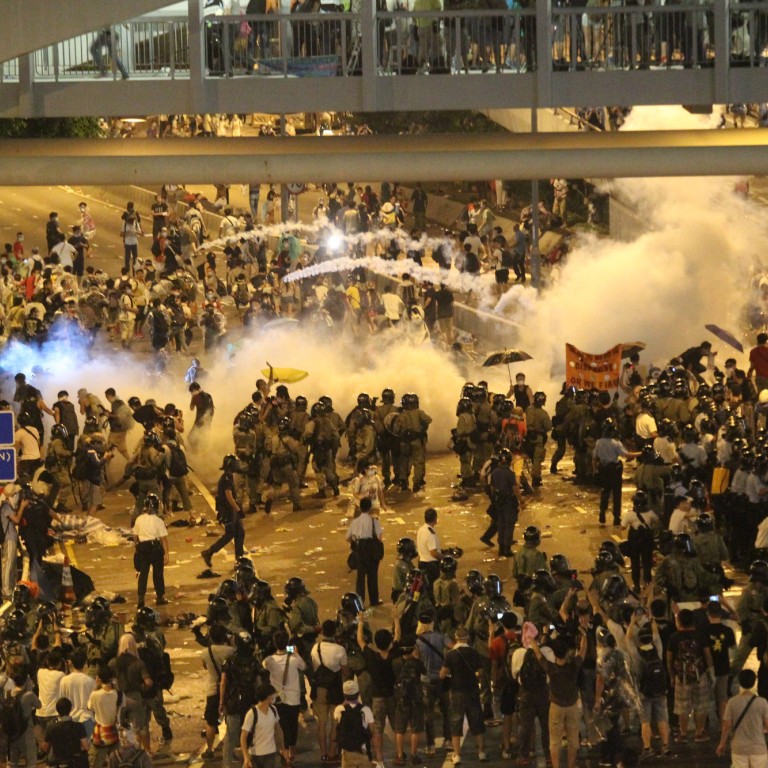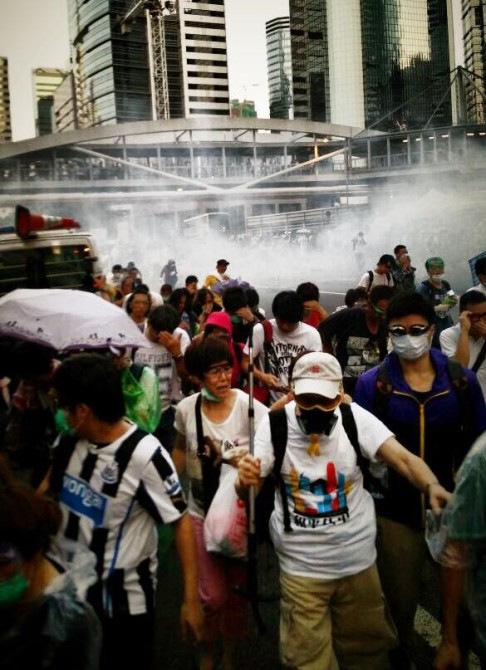
First night of Occupy Central: My six hours in Admiralty
I gathered a few essentials – cell phone, notebook, pen, face towel and eye goggles – and left my apartment. I met up with my brother Kelvin at Lippo Centre and we walked to the section of the Connaught Road expressway that had been taken over by protesters and regular citizens who supported them. We were about 50 metres from the government offices, the epicentre of a massive student protest and the frontline of a police standoff.
It was 3:45pm. By then, there were throngs of people all around us, many wearing goggles and raincoats to guard against pepper spray. Some put saran wrap around their eye-gear for extra protection. Tanya Chan (陳淑莊), vice chairwoman of the Civic Party, was speaking into a bullhorn. A student wove through the crowd with a loudspeaker broadcasting her words. Chan asked citizens to hold the line outside the Bank of China tower to stop police from advancing. She also warned us about undercover cops collecting intelligence from the crowd. “Strike up a conversation with anyone who looks suspicious,” she said.
From afar, someone yelled “Saline water! We need saline water!” Other supplies were needed too: face masks, umbrellas and drinking water. My brother and I went to see what we could do to help. We joined the human chain passing supplies from one side of Connaught Road to the other. They were for student protesters who had been pepper-sprayed by police. The girl next to me, who was about 15, shoved a carton of fresh milk into my hand. “Pass it on,” she said. Milk is supposed to sooth the eyes because it neutralises the chemicals in the pepper spray. There was order in this chaos: everyone was a commander and everyone was a foot soldier.
We hit a lull in the calls for supplies. I told Kelvin I needed to use the bathroom and we walked to a nearby shopping mall. On our way back, I proposed to grab a few supplies for the frontline. My brother had overheard that saline water was most needed, and so we spent the next 45 minutes scouring Wanchai for pharmacies, because other volunteers had already emptied the shelves in the vicinity.

Over the next hour, we kept hearing shots being fired, boom boom boom, like fireworks in Chinese New Year. The use of tear gas had caught the city by surprise. If you follow local news, you would know about the famous episode at the 2012 chief executive election, when the then-candidate CY Leung was accused during a televised debate by his opponent Henry Tang of once proposing that riot police and tear gas be unleashed on protesters. Leung vehemently denied it at the time, but it looked like he had just fulfilled the prophecy.
Tear gas might have been commonplace elsewhere in the world, but it isn’t in Hong Kong. Leung’s decision to deploy it, despite the political price he must pay, suggests that he has been given direct orders from Beijing to do whatever it takes to clear the streets before citizens return to work Monday morning. In so doing, however, he has irreversibly altered the relationship between people and government in Hong Kong. There is no turning back now – neither for him nor for us.

It was 9:30pm and Kelvin and I agreed that we should heed the student organisers’ warning and leave for our own safety, as there were rumours that riot police would start dispersing the crowd with rubber bullets. Kelvin lives in Wanchai and I Pokfulam. We said goodbye to each other and parted ways. By then almost every road between Wanchai and Central had been blocked, either by police or by makeshift blockades set up by students. I walked about three kilometres to Sai Ying Pun, before finding a taxi to take me home. During my 30-minute walk, a single thought kept running through my head: this is not the Hong Kong I knew. Perhaps years later we would all look back on this night and tell ourselves that this is good for us. Like bitter Chinese medicine, what went down today will make us stronger and better. But like bitter Chinese medicine, it was very difficult to swallow.
I got home, which had never felt safer or quieter. I said a prayer for those who had chosen to stay in Admiralty – students who had nothing to defend themselves with but umbrellas and face masks. I took a shower and sat idly in bed. Suddenly, all that had happened in the last six hours hit me, as images and sounds finally sank in. I started to sob, and my hands shook despite myself. I wiped my eyes, turned on my computer and wrote this.

